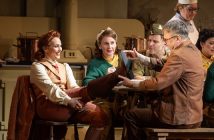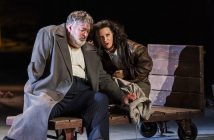Iford Festival is undoubtedly one of the most memorable ways I’ve ever experienced opera, for the idyllic backdrop of its namesake host Iford Manor, nestled in the heart of glorious countryside on the Somerset/Wiltshire border, is a stirring experience on fair days or foul. Whilst opera performances take place in the covered and enclosed cloister within the Grade I listed Harold Peto Gardens, the festival organisers are nevertheless wise to erect marquees in order to provide picnickers with shelter whatever the weather, and visitors respond with according resilience and a determination to enjoy this magical summer event to the full.
Now in its twenty-first season, this annual music festival, located just six miles from the city of Bath, is the South West’s answer to Glyndebourne, but is perhaps all the more exclusive due to its sheer size (only 90 seats per performance), which, when coupled with the fact that there is no black tie dress code, and all ticket holders are invited to partake of tea/coffee and housekeeper’s biscuits in the interval, gives you an altogether more relaxed atmosphere.

But don’t let the scale and (albeit rather posh) village fête tone disarm you, opera is taken incredibly seriously here, both by the producers and the punters who return year-in-year-out to watch tenors and sopranos fresh from the Royal Opera House, English National Opera and other world-class companies, or have a go at spotting future headliners. With over fifty opera productions under their belt, just a few minutes into any production will tell you that those booked to perform at Iford Opera are sourced carefully and uncompromisingly.
The 2016 festival programme includes two concerts, three picnic proms and three full opera productions; Mozart’s The Magic Flute, Purcell’s A Fairy Queen and Verdi’s Macbeth, and there certainly couldn’t have been a more atmospheric evening for the Italian maestro’s flamboyant take on ‘The Scottish Play’ (first premièred in 1847) due to the thunder and lightening greeting guests, while the rather spooky Italianate cloisters, make for a particularly foreboding opening scene featuring the three witches (Aoife O’Connell, Claire Filer and Sarah Richmond).

Laura Parfitt as Lady Macbeth
This new production of Macbeth, directed by Bruno Ravella, features a cast of thirteen and a scaled down orchestra which is no less powerful when taking into account such an intimate venue, and thanks to the renowned Oliver Gooch’s masterly leadership. Sung in English, (presumably because it would be nigh on impossible to offer subtitles in such a venue), whilst translations don’t tend to be as melodic as hearing an opera in its original language, the Scottish setting of this opera means that it is in fact an improvement, and allows the audience to identify some of Shakespeare’s most famous lines. The melodies, though not in the least Celtic-sounding, are extremely sweeping, while all the powerful arias and choruses you look for in Verdi are mesmerising in their richness and vigour.
The orchestra, positioned at the north of the square cloister, offers the audience, who are seated on the other three sides, a good view of their own contribution, while the centre of the square is niftily transformed into an effective stage; ever-evolving through myriad set changes designed by Alyson Cummins who cleverly utilises authentic-looking props, costumes, mist machines and candlelight in order to recreate the interior of Macbeth’s castle and subsequent court. At times the candlelight flickering on the stone walls provides all the eeriness and grotesqueness the story commands, and you simply wouldn’t find this anywhere else. Verdi’s tenth opera, yet his first Shakespeare adaptation, it’s a far cry from a traditional opera house staging and I imagine the composer would have taken considerable pride in seeing such a quality production bring his vision to life.

Baritone Eddie Wade is a fine Macbeth and a convincing pawn in Lady Macbeth’s game of power, while both he and the steely-looking Laura Parfitt clearly enjoy encouraging the audience to swing between feelings of pity and loathing for them as the drama unfolds. The nature of the seating means that you feel as though your eye is permanently glued to the keyhole and what a fascinating watch (and listen) it is. Wade and Parfitt are fine actors who vocalise the immense emotional spectrum these characters live through in the days following Macbeth’s murder of the King – for the price of the crown, as we all know, will cost them dear. The inevitable destruction of their marriage is reminiscent of Elizabeth Taylor and Richard Burton in Who’s Afraid of Virginia Woolf and they in turn are flanked by the superb Barnaby Rea as Banquo and Christopher Turner as MacDuff who, after some more murders, battles and witchcraft thrown in, halts the opera you never want to end by proclaiming Malcolm (Oliver Brignall) king of Scotland. It was bloody good.
Macbeth at Iford Arts Festival is now ended, however, other productions and events continue until Saturday 6th August 2016. For more information and to purchase tickets please visit the website.




